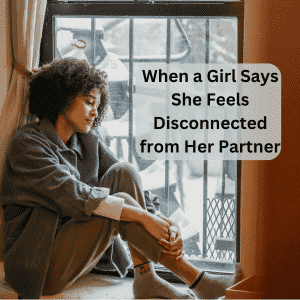When a girl says she feels disconnected from her partner, it signifies an emotional distance that can stem from communication breakdowns, lack of quality time, unresolved conflicts, or external stressors. Addressing this involves open communication, spending meaningful time together, resolving conflicts, and possibly seeking professional help. By understanding the root causes and taking proactive steps, couples can rebuild their connection and strengthen their relationship.
Feeling disconnected from a partner is a challenging and often distressing experience. It can lead to misunderstandings, emotional distance, and even the potential end of a relationship if not addressed promptly and effectively. Understanding the reasons behind this feeling and learning how to reconnect is essential for maintaining a healthy and fulfilling relationship.
Understanding Relationship Disconnection
What Does Feeling Disconnected Mean?
When a girl says she feels disconnected from her partner, she is expressing a sense of emotional distance. This can manifest as a lack of intimacy, communication issues, or feeling misunderstood or neglected. It’s important to understand that this feeling is not necessarily a reflection of the relationship’s value but an indication that something needs attention.

Common Causes of Disconnection in Relationships
- Communication Breakdown: Lack of effective communication can lead to misunderstandings and emotional distance.
- Lack of Quality Time: Busy schedules and life responsibilities can result in partners spending less meaningful time together.
- Unresolved Conflicts: Persistent unresolved conflicts can create a barrier to emotional intimacy.
- Different Priorities: When partners have differing priorities or life goals, it can lead to feelings of disconnection.
- Emotional Neglect: Not feeling valued or understood by a partner can cause one to feel disconnected.
- Stress and External Pressures: Stress from work, family, or other external sources can impact the emotional connection in a relationship.
Addressing the Feeling of Disconnection
Effective Communication
Open and honest communication is crucial for addressing feelings of disconnection. Both partners should feel safe to express their feelings and concerns without fear of judgment or retaliation.
- Active Listening: Pay full attention to what your partner is saying without interrupting. Show that you understand and empathize with her feelings.
- Express Yourself: Share your own feelings and perspectives openly. This helps in creating a balanced and open dialogue.
- Non-Verbal Communication: Be mindful of body language, eye contact, and tone of voice, as these can significantly impact the message being conveyed.
Quality Time Together
Spending quality time together helps in strengthening the bond and fostering intimacy. This doesn’t necessarily mean grand gestures but rather meaningful moments that reinforce the connection.
- Scheduled Dates: Regularly scheduled dates can help ensure that you spend intentional time together.
- Shared Activities: Engage in activities that both of you enjoy. This could be anything from cooking together to taking a walk.
- Unplugged Time: Dedicate time where both of you disconnect from technology and focus solely on each other.
Resolving Conflicts
Conflict is natural in any relationship, but how it’s handled can either strengthen or weaken the connection.
- Address Issues Promptly: Don’t let issues fester. Address them as they arise to prevent resentment from building up.
- Stay Calm and Respectful: Approach conflicts calmly and respectfully. Avoid blame and focus on finding a solution.
- Seek Compromise: Be willing to compromise and find a middle ground that satisfies both partners.
Reconnecting Emotionally
Rebuilding emotional intimacy is key to overcoming feelings of disconnection.
- Physical Affection: Simple acts of physical affection, such as holding hands, hugging, or cuddling, can reinforce emotional bonds.
- Express Appreciation: Regularly express appreciation and gratitude for your partner. This helps in making them feel valued and understood.
- Deep Conversations: Engage in deep and meaningful conversations that go beyond daily routines. Discuss your dreams, fears, and aspirations.
Professional Help
Sometimes, feelings of disconnection might require the help of a professional. Relationship counseling can provide a neutral space for both partners to express their feelings and work towards a resolution.
- Therapy Sessions: Couples therapy can help in addressing underlying issues and improving communication.
- Self-Help Resources: Books, online courses, and workshops on relationship building can also provide valuable insights and tools.
FAQs About Feeling Disconnected from a Partner
1. What should I do if my partner says she feels disconnected?
Start by listening to her concerns without interrupting or getting defensive. Show empathy and validate her feelings. Discuss the possible reasons behind the disconnection and work together to find solutions, such as spending more quality time together or seeking professional help if needed.
2. How can we improve our communication to feel more connected?
Improving communication involves active listening, being open and honest, and ensuring both partners feel heard and understood. Setting aside regular times to talk without distractions can help in maintaining a strong connection.
3. Can stress from work or other external factors cause disconnection in a relationship?
Yes, external stressors such as work pressure, family issues, or financial concerns can impact the emotional connection between partners. It’s important to address these stressors together and find ways to support each other through difficult times.
4. How do I know if we need professional help?
If you’ve tried addressing the issues on your own without success, or if the feelings of disconnection are causing significant distress in the relationship, it may be beneficial to seek the help of a professional therapist or counselor.
5. How can we reconnect if we have very different interests and hobbies?
Finding common ground is key. Look for activities or interests that you can both enjoy together. It’s also important to respect each other’s individual interests and support them, while also making time for shared experiences.
Practical Tips for Reconnecting with Your Partner
Engage in New Experiences Together
Trying new activities or experiences together can help in reigniting the spark and building new memories.
- Travel: Plan a trip or a weekend getaway to break the routine and spend quality time together.
- Hobbies: Take up a new hobby or class together, such as cooking, dancing, or painting.
- Adventures: Try adventurous activities like hiking, camping, or even amusement park visits to create exciting new memories.
Practice Gratitude and Appreciation
Regularly expressing gratitude and appreciation can strengthen your emotional bond.
- Daily Gratitude: Make it a habit to express what you appreciate about your partner daily.
- Small Gestures: Small gestures, like leaving a sweet note or doing something thoughtful, can make a big difference.
Maintain Physical Intimacy
Physical intimacy is a crucial component of a healthy relationship.
- Affection: Regularly show physical affection, such as hugs, kisses, or holding hands.
- Intimacy: Make time for physical intimacy and ensure both partners’ needs and boundaries are respected and fulfilled.
Build Emotional Safety
Creating a safe emotional environment allows both partners to express themselves openly.
- Non-Judgmental Space: Create a non-judgmental space where both of you can share your thoughts and feelings without fear of criticism.
- Support: Offer support and understanding, especially during difficult times.
Set Relationship Goals
Setting goals for your relationship can help in working towards a common future.
- Short-Term Goals: Set short-term goals like planning weekly date nights or tackling a home project together.
- Long-Term Goals: Discuss long-term goals such as future travel plans, financial goals, or family planning.
Conclusion
Feeling disconnected from a partner is a common but challenging experience. By understanding the underlying causes and taking proactive steps to address them, couples can rebuild their emotional connection and strengthen their relationship. Effective communication, quality time, resolving conflicts, and seeking professional help when necessary are key strategies in overcoming disconnection.
Remember, every relationship requires effort and commitment from both partners. By working together and supporting each other, you can navigate through the feelings of disconnection and build a deeper, more fulfilling relationship.
FAQs
1. How long does it take to reconnect after feeling disconnected?
The time it takes to reconnect can vary depending on the severity of the disconnection and the effort both partners put into addressing it. It can take a few weeks to several months to rebuild a strong connection.
2. Can disconnection lead to the end of a relationship?
If left unaddressed, feelings of disconnection can potentially lead to the end of a relationship. It’s crucial to recognize and address these feelings early to prevent further emotional distance.
3. How can we keep the spark alive in our relationship?
Keeping the spark alive involves regular effort from both partners. This includes maintaining communication, spending quality time together, trying new activities, and regularly expressing love and appreciation.
4. Is it normal to feel disconnected sometimes?
Yes, it’s normal to experience periods of disconnection in a relationship, especially during stressful times or major life changes. The key is to recognize these periods and work together to reconnect.
5. What if one partner is not willing to work on the relationship?
If one partner is unwilling to work on the relationship, it can be challenging to overcome feelings of disconnection. In such cases, seeking professional help can provide guidance. If the unwillingness persists, it may be necessary to reevaluate the relationship’s future.



